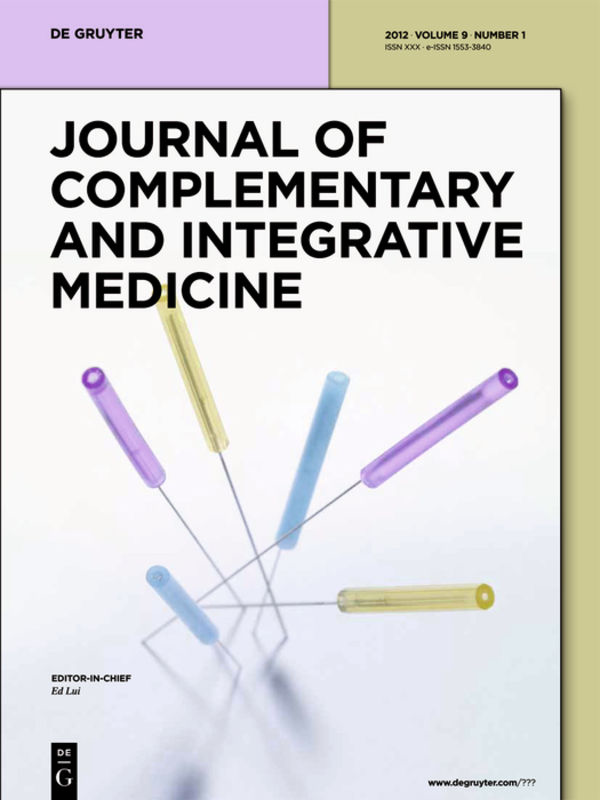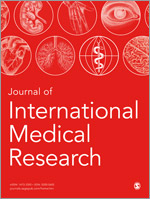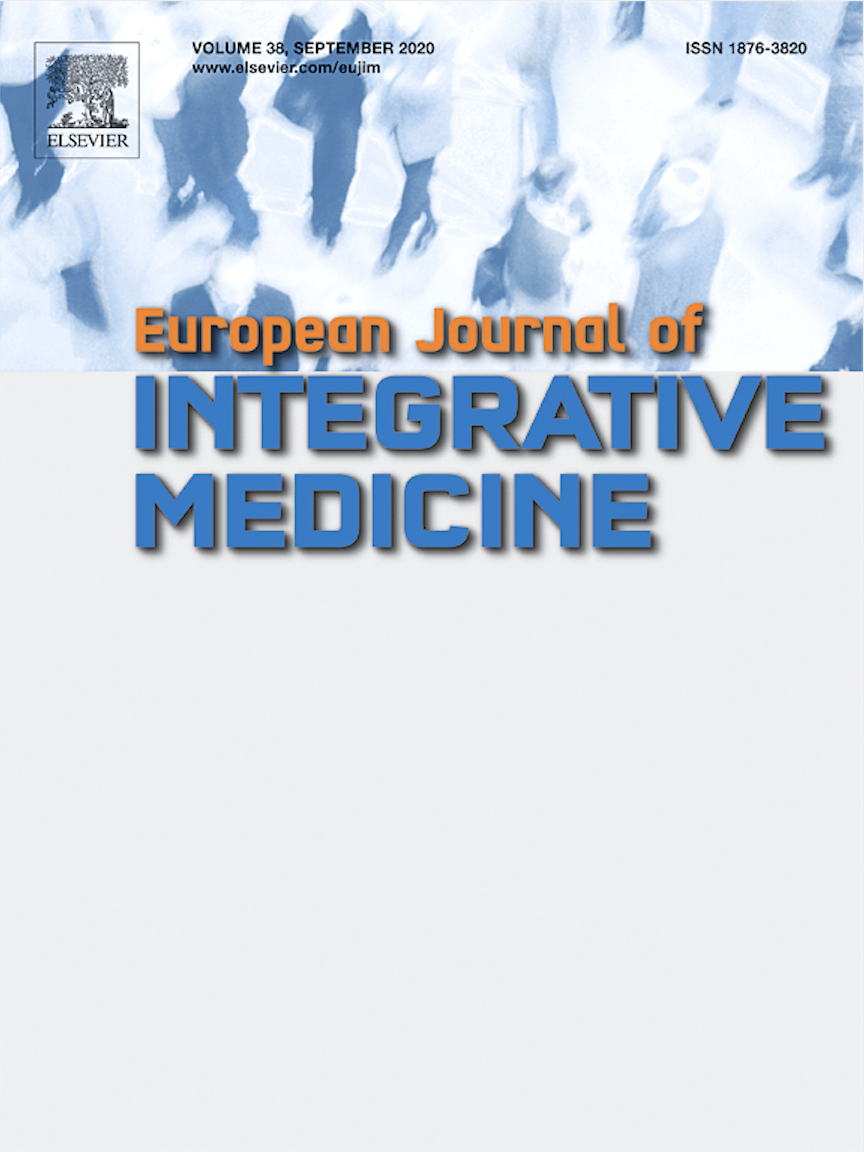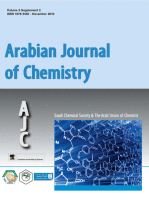Fennel Seed
How to submit an article:
- Registered users can submit any published journal article that has a unique DOI (Digital Object Identifier) name or link to Research Hub.
- For example, you can paste the full DOI link:
https://doi.org/10.1109/5.771073or just the DOI name:10.1109/5.771073into the field above and click submit. - The person who is first to submit a valid article to Research Hub will forever be credited for it, and every article submission earns you +6 Research Points.
Published research studies are articles that present the findings of original research that has undergone a peer-review process and has been made publicly available in scholarly journals, books or other media.

Effect of fennel on primary dysmenorrhea: a systematic review and meta-analysis
2021 Jan 11 Journal of Complementary and Integrative Medicine Hadis Shahrahmani, Masumeh Ghazanfarpour, Nasim Shahrahmani, Fatemeh Abdi, Robert D. E. Sewell and Mahmoud Rafieian-Kopaei
Systematic Review Meta-AnalysisFennel intake decreased significantly the intensity of dysmenorrhea compared to placebo and was similar to non-steroidal anti-inflammatory drugs such as mefenamic acid.

Efficacy of herbal medicine (cinnamon/fennel/ginger) for primary dysmenorrhea: a systematic review and meta-analysis of randomized controlled trials
2020 Jun 30 Journal of International Medical Research Xu Y, Yang Q, Wang X
Systematic Review Meta-Analysis Ginger Ceylon Cinnamon Period Pain Period Pain & Endometriosis Fennel SeedFor primary dysmenorrhoea, cinnamon/fennel/ginger effectively reduced pain intensity, and cinnamon shortened the duration of pain.

Intranasal use of lavender and fennel decreases salivary cortisol levels and improves quality of sleep: A double-blind randomized clinical trial
2020 Feb European Journal of Integrative Medicine Polonini H, Mesquita D, Lanine J, Dijkers E, Gkinis S, Raposo NRB, et al.
Randomised Controlled Trial Sleep Fennel Seed Lavender CortisolIntranasal application of essential oils such as lavender and fennel (Pinetonina™) significantly lowers cortisol levels and improves sleep quality.

The comparison of fennel infusion plus dry cupping versus metformin in management of oligomenorrhoea in patients with polycystic ovary syndrome: a randomised clinical trial
2019 Mar 11 Journal of Obstetrics and Gynaecology Mokaberinejad R, Rampisheh Z, Aliasl J, Akhtari E.
The present study concludes that fennel seed infusion plus a dry cupping therapy is effective and safe in reducing the days between two menstrual periods and manages oligomenorrhoea.
Randomised Controlled Trial PCOS
The effects of fennel on menstrual bleeding: A systematic review and meta-analysis
2018 Mar Journal of Complementary and Integrative Medicine Nafiseh Ghassab Abdollahi, Mojgan Mirghafourvand and Sanaz Mollazadeh
Systematic Review Meta-Analysis Women's Health Fennel Seed Menstrual BleedingFennel caused a significant increase in mean menstrual bleeding in the first cycle after treatment in the intervention group compared to the control.
Research insights are moderated by the Research Hub team and offer an at-a-glance overview of interesting research findings.

2021 Journal of Complementary and Integrative Medicine
Fennel intake decreased significantly the intensity of dysmenorrhea compared to placebo and was similar to non-steroidal anti-inflammatory drugs such as mefenamic acid.
Systematic Review
Effect of fennel on primary dysmenorrhea: a systematic review and meta-analysis
Hadis Shahrahmani, Masumeh Ghazanfarpour, Nasim Shahrahmani, Fatemeh Abdi, Robert D. E. Sewell and Mahmoud Rafieian-Kopaei

2020 Journal of International Medical Research
For primary dysmenorrhoea, cinnamon/fennel/ginger effectively reduced pain intensity, and cinnamon shortened the duration of pain.
Systematic Review Ceylon Cinnamon Ginger Period Pain Period Pain & Endometriosis
Efficacy of herbal medicine (cinnamon/fennel/ginger) for primary dysmenorrhea: a systematic review and meta-analysis of randomized controlled trials
Xu Y, Yang Q, Wang X

2020 European Journal of Integrative Medicine
Intranasal application of essential oils such as lavender and fennel (Pinetonina™) significantly lowers cortisol levels and improves sleep quality.
Randomised Controlled Trial Cortisol Lavender Sleep
Intranasal use of lavender and fennel decreases salivary cortisol levels and improves quality of sleep: A double-blind randomized clinical trial
Polonini H, Mesquita D, Lanine J, Dijkers E, Gkinis S, Raposo NRB, et al.

2018 Journal of Complementary and Integrative Medicine
Fennel caused a significant increase in mean menstrual bleeding in the first cycle after treatment in the intervention group compared to the control.
Systematic Review Menstrual Bleeding Women's Health
The effects of fennel on menstrual bleeding: A systematic review and meta-analysis
Nafiseh Ghassab Abdollahi, Mojgan Mirghafourvand and Sanaz Mollazadeh

2016 Arabian Journal of Chemistry
Fennel exhibits antifungal, antibacterial, antioxidant, antithrombotic and hepatoprotective activities.
Review Article Antifungal Antioxidant
Foeniculum vulgare: A comprehensive review of its traditional use, phytochemistry, pharmacology, and safety
Manzoor A.Rather, Bilal A.Dar, Shahnawaz N.Sofia, Bilal A.Bhat, Mushtaq A.Qurishi
Review Articles
Review articles summarise and critically evaluate the current state of research on a specific topic or field by synthesising multiple primary research studies.

Effect of fennel on primary dysmenorrhea: a systematic review and meta-analysis
2021 Jan 11 Journal of Complementary and Integrative Medicine Hadis Shahrahmani, Masumeh Ghazanfarpour, Nasim Shahrahmani, Fatemeh Abdi, Robert D. E. Sewell and Mahmoud Rafieian-Kopaei
Systematic Review Meta-AnalysisFennel intake decreased significantly the intensity of dysmenorrhea compared to placebo and was similar to non-steroidal anti-inflammatory drugs such as mefenamic acid.

Efficacy of herbal medicine (cinnamon/fennel/ginger) for primary dysmenorrhea: a systematic review and meta-analysis of randomized controlled trials
2020 Jun 30 Journal of International Medical Research Xu Y, Yang Q, Wang X
Systematic Review Meta-Analysis Ginger Ceylon Cinnamon Period Pain Period Pain & Endometriosis Fennel SeedFor primary dysmenorrhoea, cinnamon/fennel/ginger effectively reduced pain intensity, and cinnamon shortened the duration of pain.

The effects of fennel on menstrual bleeding: A systematic review and meta-analysis
2018 Mar Journal of Complementary and Integrative Medicine Nafiseh Ghassab Abdollahi, Mojgan Mirghafourvand and Sanaz Mollazadeh
Systematic Review Meta-Analysis Women's Health Fennel Seed Menstrual BleedingFennel caused a significant increase in mean menstrual bleeding in the first cycle after treatment in the intervention group compared to the control.

Foeniculum vulgare: A comprehensive review of its traditional use, phytochemistry, pharmacology, and safety
2016 Nov Arabian Journal of Chemistry Manzoor A.Rather, Bilal A.Dar, Shahnawaz N.Sofia, Bilal A.Bhat, Mushtaq A.Qurishi
Review Article Antioxidant Fennel Seed AntifungalFennel exhibits antifungal, antibacterial, antioxidant, antithrombotic and hepatoprotective activities.
Clinical Trials
Clinical trials are research studies that involve people and are conducted to evaluate the safety and efficacy of new treatments or interventions, such as drugs, medical devices, or behavioural therapies.

Intranasal use of lavender and fennel decreases salivary cortisol levels and improves quality of sleep: A double-blind randomized clinical trial
2020 Feb European Journal of Integrative Medicine Polonini H, Mesquita D, Lanine J, Dijkers E, Gkinis S, Raposo NRB, et al.
Randomised Controlled Trial Sleep Fennel Seed Lavender CortisolIntranasal application of essential oils such as lavender and fennel (Pinetonina™) significantly lowers cortisol levels and improves sleep quality.

The comparison of fennel infusion plus dry cupping versus metformin in management of oligomenorrhoea in patients with polycystic ovary syndrome: a randomised clinical trial
2019 Mar 11 Journal of Obstetrics and Gynaecology Mokaberinejad R, Rampisheh Z, Aliasl J, Akhtari E.
The present study concludes that fennel seed infusion plus a dry cupping therapy is effective and safe in reducing the days between two menstrual periods and manages oligomenorrhoea.
Randomised Controlled Trial PCOSThe Effect of Herbal Tea Containing Fennel Seed on Breast Milk Sufficiency Signs and Growth Parameters of Iranian Infants
2014 Nov 24 Shiraz E-Medical Journal Ghasemi V, Kheirkhah M, Neisani Samani L, Vahedi M
This study showcased fennel tea improved breast milk sufficiency signs.
Randomised Controlled Trial Fennel SeedStudy Protocols
Published study protocols are detailed plans that outline the objectives, methodology, statistical analyses, and organisation of a research study that have been made publicly available for others to review and use as a reference.
Presentation Slides

Systematic Review
Fennel intake decreased significantly the intensity of dysmenorrhea compared to placebo and was similar to non-steroidal anti-inflammatory drugs such as mefenamic acid.
Hadis Shahrahmani, Masumeh Ghazanfarpour, Nasim Shahrahmani, Fatemeh Abdi, Robert D. E. Sewell and Mahmoud Rafieian-Kopaei

Systematic Review
For primary dysmenorrhoea, cinnamon/fennel/ginger effectively reduced pain intensity, and cinnamon shortened the duration of pain.
Xu Y, Yang Q, Wang X

Randomised Controlled Trial
Intranasal application of essential oils such as lavender and fennel (Pinetonina™) significantly lowers cortisol levels and improves sleep quality.
Polonini H, Mesquita D, Lanine J, Dijkers E, Gkinis S, Raposo NRB, Brandão MAF, Ferreira AO

Systematic Review
Fennel caused a significant increase in mean menstrual bleeding in the first cycle after treatment in the intervention group compared to the control.
Nafiseh Ghassab Abdollahi, Mojgan Mirghafourvand and Sanaz Mollazadeh

Review Article
Fennel exhibits antifungal, antibacterial, antioxidant, antithrombotic and hepatoprotective activities.
Manzoor A.Rather, Bilal A.Dar, Shahnawaz N.Sofia, Bilal A.Bhat, Mushtaq A.Qurishi
Executive Summary
Write an executive summary in the form of a blog article on the topic of "Research into Chinese medicine treatment for Fennel Seed" summarising the research below and using language that can be easily understood by patients and avoiding medical jargon using a professional and caring tone of voice.
Write an executive summary in the form of a blog article on the topic of "Researched Chinese medicine treatments for Fennel Seed" summarising the research below in an objective and easy to understand way, and using language that can be easily understood by patients. Group the article into Chinese medicine treatments first, followed by nutrition and other treatments. Avoid using medical jargon and use a professional and caring tone of voice.
Write me a concise but easy to understand executive summary on the topic of "Chinese medicine treatments for Fennel Seed" based on the following research that I will give you. Your summary should be 2 paragraphs long in Australian English spelling and include references to the studies.
A Systematic Review published in 2021 in the journal Journal of Complementary and Integrative Medicine found that Fennel intake decreased significantly the intensity of dysmenorrhea compared to placebo and was similar to non-steroidal anti-inflammatory drugs such as mefenamic acid. Meta-analysis of these trials showed that F. vulgare intake decreased significantly the intensity of dysmenorrhea compared to the placebo. However, the effect of Mefenamic acid with F. vulgare was not different from each other. The F. vulgare alleviates dysmenorrhea. Regarding the same effect of F. vulgare with NSAIDs, it is highly recommend to the women suffered from dysmenorrhea specifically the ones who have high tendency toward herbal medicine.
A Systematic Review published in 2020 in the journal Journal of International Medical Research found that For primary dysmenorrhoea, cinnamon/fennel/ginger effectively reduced pain intensity, and cinnamon shortened the duration of pain. Nine studies with 647 patients were selected. Compared with the results in the control group, pain intensity was significantly relieved in the trial group when assessed by the intervention, observation period, and study quality. Pain duration was significantly shorter in the trial group. No publication bias was observed for either outcome.
A Randomised Controlled Trial published in 2020 in the journal European Journal of Integrative Medicine found that Intranasal application of essential oils such as lavender and fennel (Pinetonina™) significantly lowers cortisol levels and improves sleep quality. The study included 45 participants divided into three groups: one group received a saline nasal spray (Group 1 CTRL), the second group received a 30% concentration of Pinetonina™ in a buffered vehicle as an intranasal spray (Group 2 P30), and the third group received a 50% concentration of the same (Group 3 P50). The sprays were used once daily before bedtime for three months. The study measured salivary cortisol levels both at the beginning and end of the trial and assessed subjects' quality of sleep, anxiety levels, perceived stress, and overall quality of life using self-reported questionnaires. The study found that the groups using the 30% and 50% Pinetonina™ solutions saw significant reductions in their cortisol levels after the three-month period. The subjects in the 50% Pinetonina™ group also reported a notable improvement in their quality of sleep. However, there were no significant differences among the groups' perceived stress levels and their overall quality of life. Nevertheless, the study concluded that nightly intranasal use of Pinetonina™ could effectively lower cortisol levels and enhance sleep quality.
A Systematic Review published in 2018 in the journal Journal of Complementary and Integrative Medicine found that Fennel caused a significant increase in mean menstrual bleeding in the first cycle after treatment in the intervention group compared to the control. A total of 7993 articles were identified through searching the databases, of which 7327 were excluded as duplicates and 666 were screened for inclusion. Six hundread and forty six were excluded by title and abstract based on not being relevant to the review and being conducted on animals. Eventually, six articles were included in the study and four articles entered into the meta-analysis. The results from meta-analysis showed that using fennel caused a significant increase in mean menstrual bleeding in the first cycle after treatment in the intervention group compared to the control. However, it had no significant effect on menstrual bleeding in the second cycle after treatment.
A Review Article published in 2016 in the journal Arabian Journal of Chemistry found that Fennel exhibits antifungal, antibacterial, antioxidant, antithrombotic and hepatoprotective activities. Fennel is a medicinal and aromatic plant with a diverse pharmacological spectrum and having considerable importance in particular to food industry. Its aroma active compounds such as anethole (and its polymers like dianethole and photoanethole) estragole, (+)-Fenchone and P-anisaldehyde have been recognised as the biologically active molecules possessing oestrogenic, acaricidal and antithrombotic activities. The phenolic molecules present in fennel have been shown to possess potent antioxidant activity in a number of experiments. These bioactive molecules in fennel can be developed as novel pharmacological lead molecules provided their bioavailability, pharmacokinetics, physiological pathways, and importance to human health are known with sufficient detail.
Moderation Tools
Topic
Sign In
Users not signed in are limited to viewing the 5 most recent items of content.